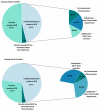Provider attitudes toward public-private collaboration to improve immunization reminder/recall: a mixed-methods study
- PMID: 24369870
- PMCID: PMC3874292
- DOI: 10.1016/j.acap.2013.09.003
Provider attitudes toward public-private collaboration to improve immunization reminder/recall: a mixed-methods study
Abstract
Objective: To assess primary care providers' current reminder/recall practices, preferences for collaboration with health departments in reminder/recall efforts, attitudes toward practice-based and population-based reminder/recall, and experiences with a population-based reminder/recall intervention.
Methods: Providers responsible for making decisions about immunization delivery at all primary care practices that participate in the Colorado Immunization Information System were surveyed. Data collection was preceded by an intervention in which half of 14 counties received a population-based reminder/recall intervention conducted by the health department. Practice staff involved in immunization activities were then selected for semistructured telephone interviews that were based on the location of their practice within specified strata, including whether they were in the intervention counties, urban/rural location, and practice type.
Results: A total of 282 (73.6%) of 383 of providers responded to the survey, and 253 who administered vaccines to children 19 to 35 months were retained; 82 staff members at 36 practices were interviewed. Providers' preferences for who should conduct reminder/recall were almost evenly split, with slightly more indicating that it should be conducted by the health department. Cost and feasibility issues were perceived barriers to conducting practice-based recall, particularly among urban practices. Support for population-based reminder/recall was highest among rural practices. Concern about perceived inaccuracies in immunization registry data was the major barrier to conducting population-based reminder/recall. The population-based intervention did not create an undue burden on practices.
Conclusions: A collaborative approach to reminder/recall involving both providers and health departments is preferable for many providers and may be a viable solution to the barriers of practice-based reminder/recall.
Keywords: immunizations; public–private collaboration; recall and reminder messages.
Copyright © 2014 Academic Pediatric Association. Published by Elsevier Inc. All rights reserved.
Figures
References
-
- AIRA Modeling of Immunization Registry Operations Work Group [Accessed October 7, 2012];Reminder/Recall in Immunization Information Systems. Available at http://www.immregistries.org/resources/AIRA-MIROW_RR_041009.pdf.
-
- Szilagyi PG, Bordley C, Vann JC, et al. Effect of patient reminder/recall interventions on immunization rates: A review. JAMA. 2000;284:1820–1827. PM:11025835. - PubMed
-
- Dombkowski KJ, Harrington LB, Dong S, Clark SJ. Seasonal influenza vaccination reminders for children with high-risk conditions: a registry-based randomized trial. Am J Prev Med. 2012;42:71–75. PM:22176850. - PubMed
-
- Daley MF, Barrow J, Pearson K, et al. Identification and recall of children with chronic medical conditions for influenza vaccination. Pediatrics. 2004;113:e26. PMID: 14702491. - PubMed
-
- Kempe A, Daley MF, Barrow J, et al. Implementation of universal influenza immunization recommendations for healthy young children: results of a randomized, controlled trial with registry-based recall. Pediatrics. 2005;115:146–54. PMID: 15629993. - PubMed
Publication types
MeSH terms
Grants and funding
LinkOut - more resources
Full Text Sources
Other Literature Sources
Medical


